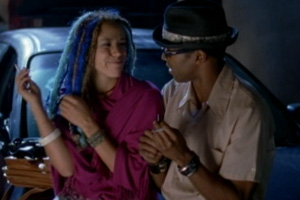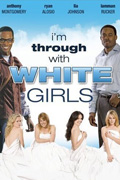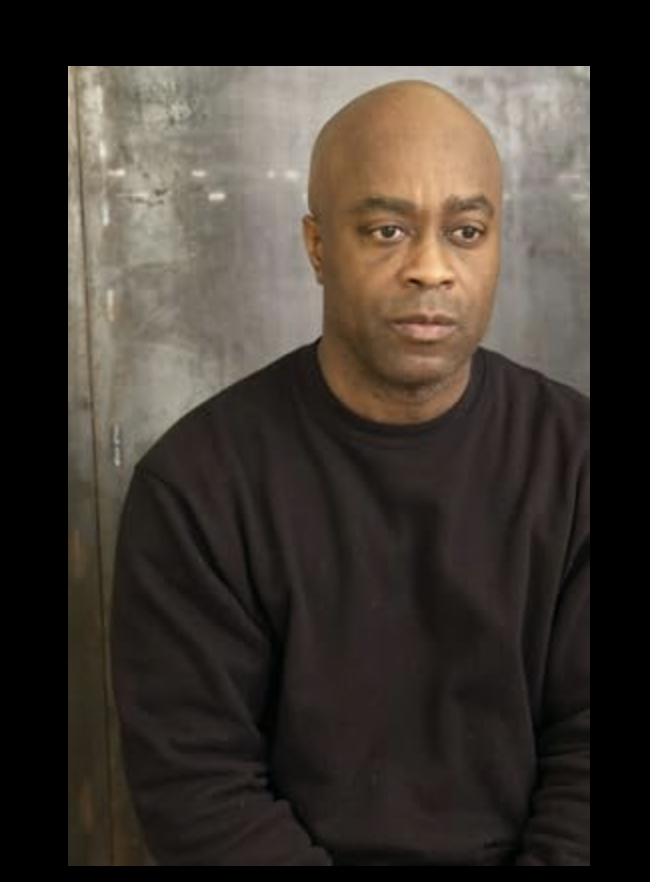(I’m Through With White Girls is now out on DVD. Buy it at Amazon.)
In my humble experience, when you tell people—especially African-Americans—to see Jennifer Sharp’s I’m Through With White Girls, they just about always giggle or flinch, or both. The title might as well jump out at your id and scream PROVOCATION, right? It might make you nervous or angry. Or you may yawn. For me, it makes me reflect on the question everyone in Indiewood has on their mind these days: how do you get anyone to see an independent film in this Darwinian marketplace for little movies? One way might be to punch somebody in the face with your title. For instance, somebody could make a movie about Afro-beat pioneer Fela Kuti that borrows the title of one of his most explosive albums, Expensive Shit.
But, I’m Through With White Girls? The danger lurking here for a film, especially one made by African-Americans, some have argued, is that such a title may overwhelm one’s access to the film itself. At a recent screening at BAM, as Karina Longworth reported about over at Spout, a black female blogger commented that she feared to tell her white female friends about the movie, setting off a wave of frustrated and humorous responses during a lively discussion following its New York premiere.
What she may have lost sight of was what she had just seen. In ITWWG, a debut feature for NYU product Sharp that was made for well under a million dollars, she and screenwriter Courtney Lilly provide us with a giddy narrative and a thematic sensibility full of productive ideological curiosities concerning race’s intersection with love and coupling in contemporary America. In the process, it earns the attention the title perhaps unduly heaps upon it and the awkwardness that it faces us to confront and, ultimately, attempts to transcend. Even within the confines of its conventionality and predictable framework, ITWWG proves to be a knowing and very funny look at a world rarely glimpsed at all in American cinema, through one of its most durable and often most disposable forms: the romantic comedy.
This being a rom-com, its protagonists are of course middle class. In some ways, one could posit that middle class black slackers in their twenties and thirties, whose paler cousins get trotted out monthly by Judd Apatow, at long last get their celluloid due in not just ITWWG, but in James Spooner’s Black Heart, White Sheep and in Barry Jenkins’ forthcoming Medicine for Melancholy. Melancholy is another film that deals with the (identity) crisis of the black hipster as seen through the machinations of a courtship, albeit one that takes place with less humor and more style than ITWWG. Jenkins’ film meanders with equal measures of earnest feeling, mumblecore posing, visual splendor and didacticism in its representation of a single day following a drunken tryst.
When ITWWG opens, Jay has broken up with another white woman. A credit sequence shows a host of white hipster gals reciting Jay’s break-up letters to them. His efforts at romance seem, like most romantic comedy protags, to be doomed to fail. Could it be that all his girlfriends are, well, Caucasian? The filmmakers have their cake and eat it too; they don’t really believe this, but they want an audience filled with a significant amount of people who do. This may cause more than a few post-Civil Right liberals—black, white and brown—to gasp. But it will also cause nearly as many working to upper middle class black women, daughters of the historically debased or a largely forgotten species (cinematically speaking) to nod and high-five their fellow Deltas. “We haven’t had wish fulfillment like this since Mahogany!” they’ll whisper. But wait, they have. Tyler Perry heaps it out every February. And Sharp’s film isn’t so crude and reactionary to merely appease, as its title may make us anticipate.
 As Jay, Anthony Montgomery is brilliant. He gives us the guy Steve Urkel may have grown up to be after a dose of Crooked Rain, Crooked Rain, a black man pushing thirty who uses cigarette holders, can’t dance and slouches around at LA clubs that host indie rock acts. As he explains to his white roommate Matt at a hangout near the beginning of the film, miscegenation is his only choice because “I’m not one of those football playing, doctor-to-be, Alpha male, talented tenth types they all like.” Then Laura Mulvey’s favorite moment in the movie happens: our Jay immediately spots Catherine Williamson (Lia Johnson), who is a square peg to the round hole he just placed all black women within and, although they won’t meet until a coincidental encounter at his friend’s fiance’s office later in the film, is immediately stricken with a calling.
As Jay, Anthony Montgomery is brilliant. He gives us the guy Steve Urkel may have grown up to be after a dose of Crooked Rain, Crooked Rain, a black man pushing thirty who uses cigarette holders, can’t dance and slouches around at LA clubs that host indie rock acts. As he explains to his white roommate Matt at a hangout near the beginning of the film, miscegenation is his only choice because “I’m not one of those football playing, doctor-to-be, Alpha male, talented tenth types they all like.” Then Laura Mulvey’s favorite moment in the movie happens: our Jay immediately spots Catherine Williamson (Lia Johnson), who is a square peg to the round hole he just placed all black women within and, although they won’t meet until a coincidental encounter at his friend’s fiance’s office later in the film, is immediately stricken with a calling.
Catherine is the sort of ziggy oddball of a character actresses of a certain age and temperament yearn to play. A skilled storyteller who can’t do public readings because of anxiety, she is loaded with over-informed opinions and double entendres while sporting hair that is somewhere between George Clinton’s and Ani DiFranco’s. In Johnson’s hands, she gives the film an equally compelling foil for Jay. With her twisty energy, Johnson is akin to the screen personas of mid-’70s Diane Keaton or something not unlike Kate Winslet’s turn in Eternal Sunshine of The Spotless Mind.
Buried within its ribald humor is a liberative frankness about the peculiar dilemmas and anxieties that confront sexually active, culturally polymorphous black men of the courting ages in America, a toll that most American black men, from the Democratic nominee for President on down, have some rarely articulated experience with. It sees the fissures within the so-called black community’s post-’60s socio-economic and cultural arrangement and, through a subplot involving the marriage of Jay’s working class black friend to a wealthy black woman, deftly satirizes them, while suggesting that blackness is more construct than defining spirit. But that’s all really beside the point. The picture makes for a lot of fun while confirming some interesting talents and manages to be more vital than it really ought to be given its genre constrictions.
Its filmmakers, a trio of mixed race black women, the twin Johnson sisters—Phyllis, who produced, and Lia, who stars—and their director for hire, the aptly named Ms. Sharp, have stated that their film modestly aspires to be about yet another late twenty-something who is afraid of commitment more so than race. That’s fair I suppose, but if you watch it very closely, you notice very interesting things happening beyond its rather standard narrative stylings and rhythms.
— Brandon Harris












